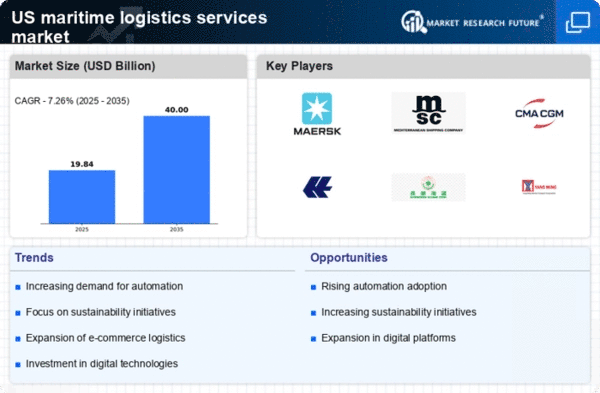E-commerce Growth
The rise of e-commerce in the US has a profound impact on the maritime logistics-services market. As online shopping continues to expand, the demand for efficient shipping and logistics solutions increases. In 2025, e-commerce sales in the US are projected to reach approximately $1 trillion, necessitating robust maritime logistics to handle the surge in goods transported by sea. This growth compels logistics providers to enhance their capabilities, ensuring timely deliveries and efficient supply chain management. The maritime logistics-services market must adapt to these changing consumer behaviors, integrating advanced technologies to streamline operations and improve customer satisfaction. Consequently, the industry is likely to see increased investments in shipping infrastructure and logistics technology to meet the evolving demands of e-commerce.
Global Trade Dynamics
The maritime logistics-services market is significantly influenced by global trade dynamics, particularly as the US engages in various trade agreements. In 2025, the anticipated increase in trade volumes, driven by new agreements, is expected to boost demand for maritime logistics services. The US is projected to see a 15% increase in containerized cargo traffic, necessitating enhanced shipping capabilities and logistics solutions. This growth presents opportunities for logistics providers to expand their services and optimize supply chains. However, it also poses challenges, as companies must navigate complex international regulations and tariffs. The maritime logistics-services market must remain agile and responsive to these changing trade dynamics, ensuring that they can meet the evolving needs of businesses engaged in global commerce.
Environmental Regulations
the maritime logistics-services market is influenced by stringent environmental regulations aimed at reducing emissions and promoting sustainability. In 2025, the US is expected to implement new regulations that require shipping companies to adopt cleaner technologies and practices. Compliance with these regulations may necessitate significant investments in eco-friendly vessels and alternative fuels, potentially costing the industry billions. However, these changes also present opportunities for innovation and differentiation within the maritime logistics-services market. Companies that proactively embrace sustainable practices may gain a competitive edge, appealing to environmentally conscious consumers and businesses. As the industry adapts to these regulatory pressures, it is likely to see a shift towards greener logistics solutions, reshaping operational strategies and service offerings.
Infrastructure Development
Investment in port and shipping infrastructure is a critical driver for the maritime logistics-services market. The US government has recognized the importance of modernizing ports to accommodate larger vessels and improve efficiency. In 2025, federal and state funding for port infrastructure is expected to exceed $5 billion, aimed at enhancing capacity and reducing congestion. This investment not only facilitates smoother operations but also attracts more shipping lines, thereby increasing competition and service options within the maritime logistics-services market. Enhanced infrastructure can lead to reduced shipping times and costs, ultimately benefiting consumers and businesses alike. As infrastructure projects progress, the maritime logistics-services market is poised for growth, driven by improved operational capabilities and increased trade volumes.
Technological Advancements
Technological advancements are reshaping the maritime logistics-services market, driving efficiency and innovation. The adoption of automation, artificial intelligence, and data analytics is transforming how logistics providers operate. In 2025, it is estimated that over 30% of shipping companies in the US will implement AI-driven solutions to optimize routing and inventory management. These technologies enable real-time tracking and predictive analytics, enhancing decision-making processes and reducing operational costs. As the maritime logistics-services market embraces these advancements, companies can improve service delivery and customer satisfaction. Furthermore, the integration of blockchain technology is expected to enhance transparency and security in supply chains, fostering trust among stakeholders. The ongoing technological evolution presents both challenges and opportunities for the industry, compelling companies to adapt and innovate.
















